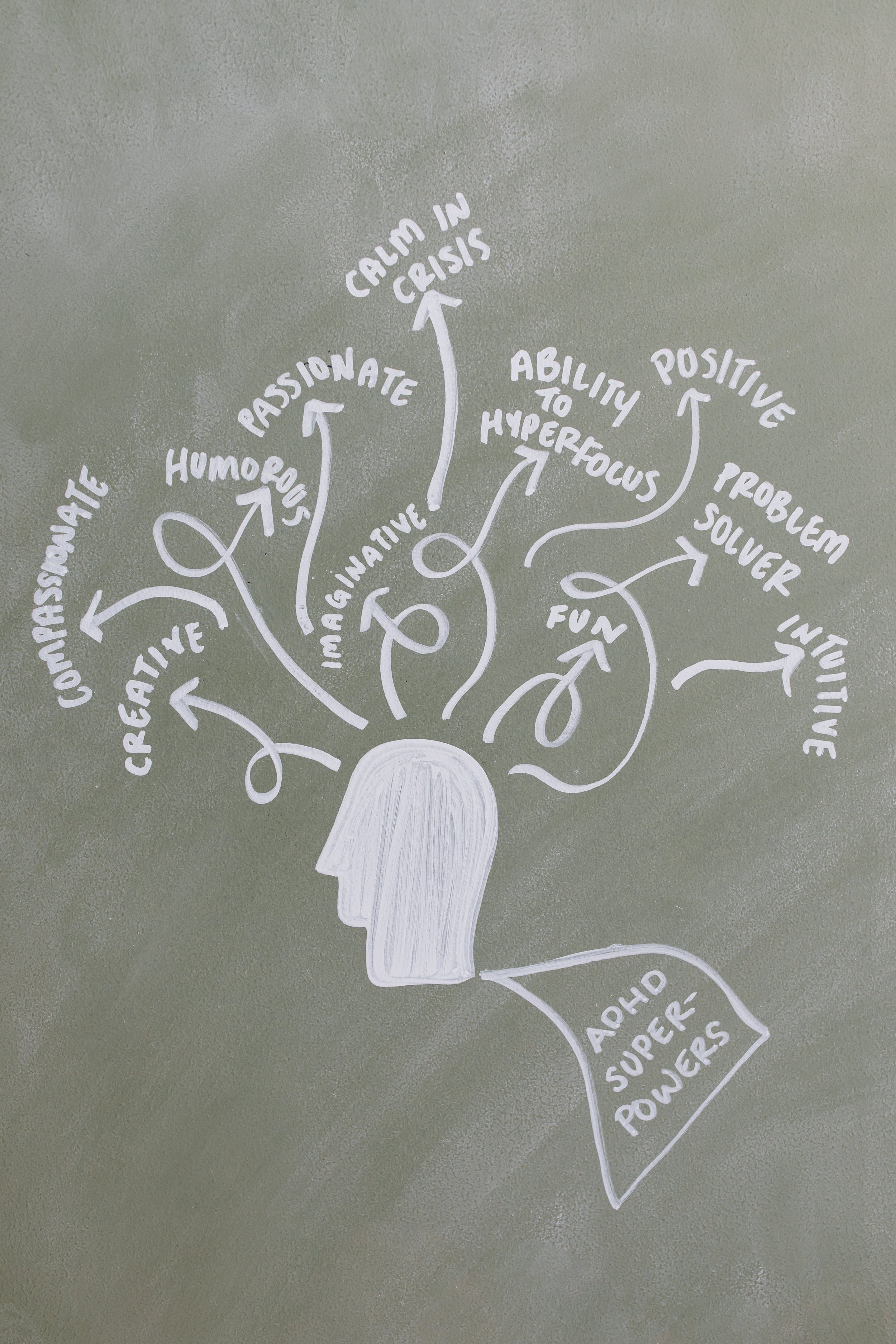
ADHD Therapy
Amplify Your Unique Strengths
Do You Relate to Any of These?
You tend to procrastinate, especially when faced with tasks that are not intrinsically interesting to you. You find yourself chronically running late. Or do you find it hard to motivate yourself to begin a task until it becomes time-sensitive? Perhaps you frequently feel lost in time and space, as if you heard nothing of what you were listening to, saw nothing of what you were looking at, or recalled nothing of what you were attempting to concentrate on. Or you find yourself jumping from one activity to another without finishing any. Maybe you have trouble keeping workspaces or homes neat and organized. Sometimes you lose your cool when people don’t act the way you think they should. Or do you find it frustrating to be forced to do something you deem pointless?
You tend to babble because you have so many thoughts and phrases racing through your head that you're afraid of forgetting the most crucial ones if you don't unleash them promptly. Or do you find it difficult to refrain from interrupting people because you can't wait to share yours? Do you fidget, like shaking your legs, tapping your toes/fingers, gnawing your nails, or biting your teeth? Do you feel restless and need to do something all the time?
You find yourself hypersensitive. This can manifest in many ways, including sensory sensitivity to light, sound, texture, etc. Perhaps you feel vulnerable to social rejection or being misunderstood? Your hypersensitivity may also express as athletic, creative, and inquisitive urges and needs. Are you a natural athlete, an artist, a craftsman, a seeker, an inventor, a shaman, a voracious reader, a poet, or a prophet?
What Is ADHD?
You see, the experiences of ADHD are diverse and dynamic. The term ADHD is misleading in that ADHD isn’t necessarily a “deficit” of attention or hyperactivity. In contrast, people with ADHD have abundant attention that absorbs all the information, but it can make focus attention (focusing on one thing) really hard.
ADHD is a neurodevelopmental condition characterized by structural and chemical differences that affect cognition, emotion, and behavior, particularly those linked to what are known as the executive functions of the brain.
Neurology of ADHD in A Nutshell
Executive functions are complex and involve many regions of the brain. People with ADHD’s brains are about 3% smaller than their neurotypical peers. The key parts that are considerably different are the prefrontal lobe (executive functioning), hippocampus (memory state), and amygdala (emotion regulation). The prefrontal lobe is perhaps most responsible for ADHD traits. Its maturation among people with ADHD is about four years later than in neurotypical peers. A less mature prefrontal cortex means that people with ADHD have fewer mental resources to allocate, prioritize, and plan for tasks.
People with ADHD also have different patterns in functional connectivity, which are patterns of oscillations that allow different brain regions to exchange information. Chemical dynamics also play a role. However, this is not due to a “chemical imbalance” but to less release/reloading of transmitter chemicals at synapses than their neurotypical peers. Anytime we use our executive functions, electrical impulses must go back and forth across the brain to communicate and activate those processes. For that to happen, there have to be neurotransmitters, namely dopamine, which is responsible for picking up the electrical stimulus from one nerve and carrying that across the synaptic space to the next nerve. An ADHD brain does not have maintenance levels of dopamine like a neurotypical brain does at all times. Without the maintenance levels of dopamine, it is tough to have access to different executive functions consistently. Two significant things that give people with ADHD lots of dopamine are high interest and fear of imminent consequences/time pressure.
ADHD & Executive Functioning
Executive functioning refers to a wide range of central control processes of the brain responsible for connecting, prioritizing, and integrating cognitive activities moment by moment to help us manage daily tasks. Drs. Peg Dawson and Richard Guare summarize the 12 essential executive functioning skills: response inhibition, working memory, emotional control, task initiation, sustained attention, planning/prioritizing, organization, time management, flexibility, metacognition (self-awareness), goal-directed persistence, and stress tolerance.
Most people with ADHD have some difficulties in a combination of the above skills. And they do seem to show up together. Modern society has placed unprecedented demands on our executive functions. The complexity we’re asked to process, the things we need to remember to get through the day, and the tasks and obligations we have pulling us in many directions can be exhausting, particularly for people with ADHD.
Common Misunderstandings of ADHD
Have you ever felt frustrated when reminded of what you needed to do? Often, people fail to recognize that ADHD is not a problem with knowledge but with motivation, performance, and self-regulation. As Dr. Russell Barkley points out, "ADD is not a problem of knowing what to do; it is a problem of doing what you know." This "problem" is brain-based and has nothing to do with the commonly held belief of "lack of willpower."
Also, it's not that people with ADHD can't pay attention; attentiveness vastly varies depending on the situation. For example, people with ADHD can hyper-focus when passionate about the work or when it is highly time-critical. Contextual factors such as immediate versus delayed reward and their setting also play an essential role.
Lastly, people with ADHD experience similar emotions to others of similar age, but some may have more difficulty recognizing, responding to, and regulating their emotions. For example, have you ever experienced emotional flooding (too much of one emotion, such as frustration, anger, sadness, and worry) or very little emotion (feeling nothing or bored)? Either emotional state certainly does not help with motivation and task initiation.
ADHD In Girls and Women
Underdiagnosis or delayed diagnosis is unfortunately common among girls and women. This is because of the prevalence of the inattentive type of ADHD among girls and women, which means no report of early childhood "behavioral or academic issues." And when hyperactivity or combined types are present, they are sometimes misdiagnosed as bipolar.
Also, ADHD symptoms among girls often do not become noticeable until puberty due to hormonal changes. Struggles can also worsen during menopause. Furthermore, depression and anxiety are more common in girls and women with ADHD than in boys and men. Similarly, girls and women with ADHD are more likely to report overeating, binge eating, and emotionally triggered eating as a form of self-calming. Bulimia is also not uncommon due to the socialization of thin ideals and the shame of "overeating."
Many girls and women with ADHD are perfectionists and highly self-critical. Perhaps you have successfully hidden your struggles with ADHD and excelled in many areas in life. People assume you have it all together, but little do they know how hard you struggle within. Perhaps you often feel overwhelmed and consumed by shame and a sense of inadequacy. Gender roles, rules, and expectations, such as attentiveness, organization, and compliance, add fuel to the fire for girls and women with ADHD. Maybe your struggles have been shamed, disempowered, and silenced. "Everybody struggles, so deal with it—alone and silently." "Your needs aren't a priority, and your voice won't be valued." "What makes you think you get special treatment?" Toxic messages like these can fuel negative self-talk and self-beliefs like "I am not good enough," "I am an impostor," or "I am too much for other people." Then you begin to shrink, apologize for everything, and hide your wants, preferences, ideas, and strengths.
How Can Therapy Help with ADHD?
When ADHD goes undiagnosed, unsupported, or misunderstood, the challenges that come with this brain difference can be daunting. Your brain requires more support and preventive care than those of others. Allow yourself to invest your energy and attention into caring for yourself the way you would care for others and healing from the impact of ADHD in an ableist society.
The purpose of therapy is not to "cure" yourself but to
Embrace and celebrate your unique way of being &
Explore a tailored, holistic approach to the complex but fulfilling life you deserve.
Are you ready to:
✔ Become more aware of your own executive functioning profile - both challenges and strengths
✔ Identify strategies that work the best for you, given your learning and behavior change preferences in crucial life domains: work/school, home, and relationships
✔ Explore ways you can modify your environment and strategies to cope with executive functioning challenges and identify resources and support to make life easier for you
✔ Begin to tackle the issue of shame, self-worth, and stigma from a position of acceptance and compassion
✔ Bring awareness to some deep, perhaps barely noticed beliefs and fears about what it means to be a person with a different way of being in the world
✔ Be close to others while still protecting self
✔ Explore what gives you purpose, meaning, and future direction that stimulates and activates you, which is crucial for people with ADHD whose brains crave input that is stimulating
✔ Become comfortable with expanding yourself and claiming your wants and needs, even if that means going slowly, small step by small step, toward your goals
✔ Become a whole person who feels complete in your own skin, brain, and life

FAQs About ADHD
-
There is no universal way of manifesting ADHD symptoms. When it becomes noticeable depends on many factors (e.g., the severity of impairment, social support, gender, and life demands). Some are obvious from an early age and are noticeable in preschool years. Some do not become apparent until middle elementary or junior high. Some do not become obvious until college or later. You may not notice ADHD symptoms until you feel that life's everyday cognitive and mental demands surpass your capacity to manage stress reasonably despite your best efforts.
-
ADHD, for most people, is a life-long condition. Most often, hyperactivity and impulsive control tend to improve as people reach adolescence or shift from external (fidgeting) to internal (restlessness) expression. However, the inattention symptoms persist and sometimes worsen, such as when transitioning to high school, college, graduate school, or a new job where it is hard to work around your executive functioning challenges. Hormones and aging can also impact your attention difficulties. Though ADHD struggles may continue to manifest in your life, so do your strengths, coping skills, and determination!
-
A high IQ does not rule out the possibility of having ADHD. In fact, those with high IQs and ADHD have similar executive functioning difficulties, particularly in working memory and processing speed. Dr. Thomas Brown’s studies in 2019 and 2011 showed that 73% of the adults and 62% of the children and adolescents (aged 6 to 17) with ADHD with an IQ over 120 had severe impairments in at least 5 of the eight executive functioning indicators.
Have parents or teachers blamed you for being “bright but lazy” growing up? Unfortunately, some people with high IQ are undiagnosed until later in life when they are challenged by academic, vocational, or life demands.
-
Research indicates that a wide range of executive functioning challenges responds well to medication treatment in 70-90% of cases in children, adolescents, and adults. With the help of the medication, most clients report improved cognitive clarity (reduced “noises”), working memory, and sustained attention. However, having realistic expectations for medications is also important. ADHD medications won’t “cure” anything, but they will help manage your struggles and make navigating daily tasks less effortful. There may be side effects, and it may take a few attempts to determine the proper medication or the right dosage. Remember, you can still live a happy and fulfilling life with ADHD!







